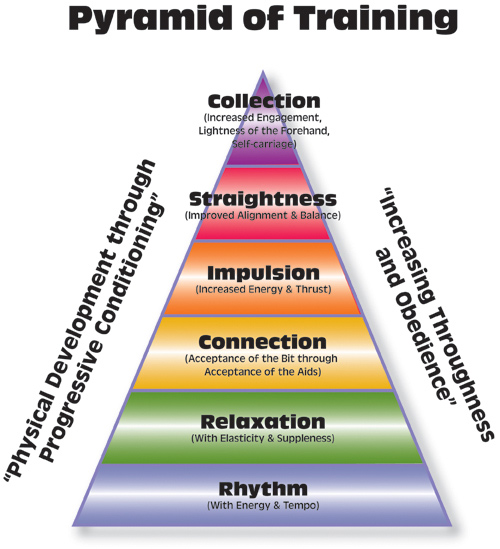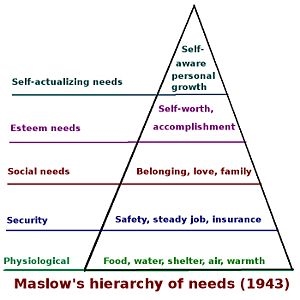Okay, we know about the dressage training pyramid...
 |
| Image Credit: USDF website |
...but today I want to talk about a different pyramid, Maslow's Pyramid of Needs.
If you're anything like me, you learned about this in Grade 7 or so and haven't really thought about it since.
I was in a management course for work this week. I don't actually manage anyone so the reason for my enrollment is a bit questionable, but my boss told me to go so I went. Anyways, at this course one thing that came up was Maslow's Pyramid of Needs and how it relates to motivation of employees at companies.
 |
| Image Credit: by Tomwsulcer from Wikipedia Commons |
The Cole's notes are this:
- The pyramid has 5 levels. The bottom level is physical needs: food, water, air, etc. The second level is safety and security needs. Third is social needs. Fourth is ego needs. Fifth is fulfillment or self-actualization needs.
- The bottom levels have to be met before we care about the upper levels. i.e. if you are physically starving, food is the priority and you don't care about your ego.
- Only an unmet need motivates us. i.e. we aren't motivated by oxygen until we don't have it.
- For the average employed person in the first world, we have the first three levels of needs (physical, safety, social) fairly well met.
Okay you're probably wondering where the horses come in, here we go:
As part of all this, there was one part of the course where it mentioned that people who are unhappy with their jobs can turn to hobbies to meet their ego and fulfillment needs. I don't necessarily agree that people only turn to hobbies if they hate their jobs. However, the connection between hobbies and the pyramid of needs was the part that I found really interesting and got me thinking...
- How do horses help us meet our ego and fulfillment needs? Is it the feeling of accomplishment? Is it the feeling of growth and improvement? Something else?
- It's kind of funny to think that on a base level we might ride to fulfill an "ego" need when we all know how humbling horses can be.
- Do we ride to fill any needs lower on the pyramid? Is it a social thing? (Social with the horse or social with other horse people?) Does knowing how to control a large animal give us some caveman sense of security?
- I don't know many riders who turned to horses because they thought "hey, I don't find my work satisfying enough, I need something else." More often it seems like horses are a grand passion that we pick up in youth and then can't get rid of it. Does this mean we look for less needs to be met by our jobs when we have them met by horses?
- How do other hobbies compare to riding when it comes to what needs they meet?
- Not all hobbies seem to be equal when it comes to how all-consuming they are. Is there a fundamental difference between hobbies that lead to meeting some need (like a feeling of accomplishment or of growth and improvement) such as sports, riding, music, art, etc, vs. a past-time that is really just used to pass the time such as watching television, surfing the internet, reading (for fun, not learning), etc. Would you classify these differently than I did?
- If a feeling of accomplishment or improvement is needed to make riding a hobby that meets upper pyramid needs, does that mean pleasure riding (where you aren't trying to train, improve, etc) is a different thing and more a passive past-time?
- Are people with a serious hobby less successful at work than people without one?
 |
| No ribbon but a serious sense of accomplishment after this ride (for completing test and not dying)! |
- How does the pyramid of needs for humans compare to that of horses? Do horses have needs beyond the first three levels?
- The comparisons between the dressage pyramid of training and the Maslow pyramid are interesting. Both are shown as a pyramid or hierarchy. Both of them require you to have lower levels in place before you can master upper levels. Also in both of them the order isn't always so clear cut and you may need to jump down and then up again as required.
What are your thoughts?
P.S. If anyone doing a Masters in Sociology or whatever wants to steal any of these questions for their thesis, please do, just send me your results please! ;-)

No comments:
Post a Comment